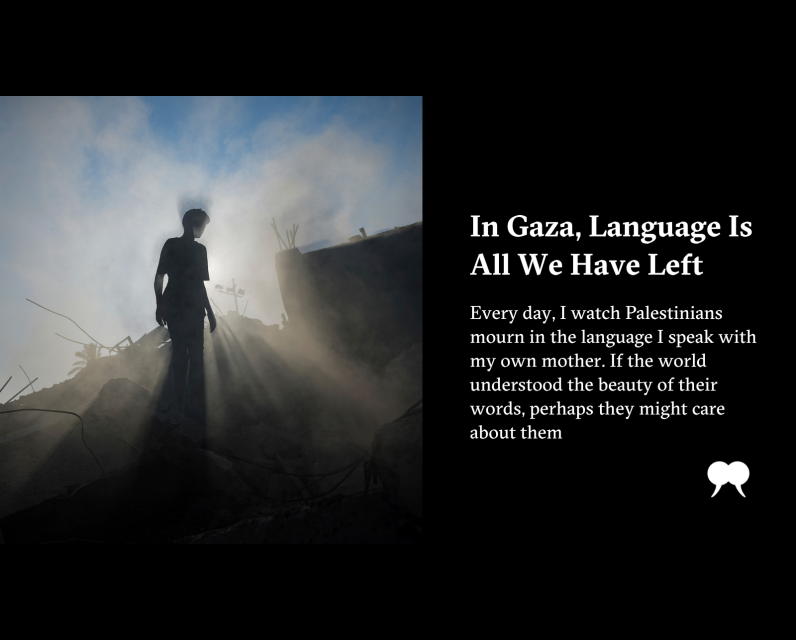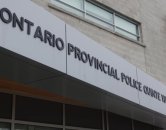Source Feed: Walrus
Author: Pacinthe Mattar
Publication Date: October 10, 2024 - 06:30
In Gaza, Language Is All We Have Left
October 10, 2024

I’m a journalist. I use words to convey things that have been verified as true, observable, and rooted in reality. A requirement of journalism is that language be stripped of emotion, of opinions, of “bias.” There should be no flowery language or poetry. Just the facts.
Under these guidelines, since October 2023, I have been pushing through fear, and a deeply ingrained self-censorship, to say yes to press interviews in which I use my journalism, my language, to tell the story of what’s happening in Gaza. And to also tell the story of how journalists’ language is sterilized, muted, and, in many cases, outright censored when we talk about Palestine and Palestinians. I’ve been talking about how, especially in the absence of foreign journalists in Gaza, we must listen to the words and testimony of those who are there, documenting, witnessing, and living it themselves. In these interviews, I’ve said that we need to be careful, as journalists, when we repeat in print and on screen unfounded things like beheaded babies or Hamas hiding under tunnels in hospitals full of the sick and wounded, because I know that language can fuel, facilitate, and allow for more bloodlust. I’ve urged caution, care, context. Language has power. It can decide who lives, who dies, whose deaths are mournable and whose can languish under rubble as collateral damage.
Every interview invitation I receive triggers instant panic. I consider giving in to the crushing weight of fear and turning them down, because I know, intimately, there is a price to be paid when you talk about Palestine or invite others to, especially Palestinians themselves. When I worked at the public broadcaster, where I spent a decade producing daily live interviews, the only story of mine that was killed was an interview with a Palestinian. And not only did the interview not air—it marked me. Years later, when I quit the job, feeling I’d hit a wall, I learned that this interview had rendered me “biased” in the eyes of a senior manager, who, under that reasoning, had thwarted my attempts to progress further professionally.
One learns to be careful with one’s language—and whose language one seeks to put on the air—when one’s own livelihood and future hang in the balance.
But livelihood is a silly thing to worry about when lives are being extinguished in the thousands. And so: I accept every interview request, and before each one, I worry about how to frame this or that thought, how to communicate about the human devastation and our inability to report on it properly for generations, the deep chill that has formed and calcified around Palestine.
I know, viscerally, that my language in these interviews has to be unimpeachable, beyond perfect, to be able to carry the weight of what I want to say, for it to be heard and deemed acceptable. The pressure is so high—the fear that if my language isn’t precise, isn’t delivered in just the right tone, in the right terms, I’ll be marked once more and cast out by my peers. The pressure is immense, immense, immense. I feel it in every part of my body. I am overcome with stress, with walking this tightrope that feels like it is only getting higher, higher, higher.
A former journalism professor writes to me after one interview airs: “You are walking an emotionally demanding and perhaps lonely road . . . as the go-to person for risky commentary about journalism. More than once in the interview I heard the reluctance and strain and risk-awareness in your voice.” This fear I’m feeling is palpable to others, I realize.
But I ride on fear-fuelled adrenaline. I do interview after interview, prepping by attempting to absorb every bit of information, scrolling on Twitter and Instagram, flipping between the BBC, Al Jazeera, Democracy Now, CNN, Fox. I watch the news in English, I watch the news in Arabic, I watch the news in French, wanting to hear it from all sides, all angles, willing myself to remember every fact, every statistic. My mind becomes a jumble of acronyms with accompanying stats to sort through: UN, WHO, MSF, CPJ, HRW. These official, recognizable bodies carry the mainstream legitimacy that people like me, who once committed the journalistic sin of wanting to put a Palestinian on the air, do not.
After a few of these interviews, the stress makes its presence known by taking away my voice. Overnight, I lose the ability to speak at all, and straining my voice yields not even a whisper. I’ve been overwhelmed into silence as I’m trying to speak about the silence of how we talk about Palestine.
Days later, I get my voice back, though it’s still weak and hoarse, just in time to do another interview on live TV. There are no edits, no retakes here, nowhere on camera to mask the vertigo of walking this tightrope. Looking at my laptop, on the table in front of me, out of view, is my attempt at a safety net if I find myself falling: notes, notes, notes, illegible, frantic.
This interview takes place just hours after a refugee camp has been bombed, and as we speak, the B-roll on screen next to my face shows an apocalyptic scene in greyscale. Men yelling, digging through rubble, an entire block of buildings razed to the ground, a crater where life used to be. I say that the Jabaliya refugee camp is one of the most densely populated in the world. I say that early reports suggest anywhere from forty to 400 people have been killed. When the TV host asks me how the “fog of war” is impacting what is happening in Israel and Gaza, I say—as images of Palestinians stumbling in shock, covered in the dust of what used to be their homes, beam on screen next to me—one thing is clear: the people paying the price of the war are Palestinians.
But despite these interviews that I’m doing, I feel like I’m failing at language in the face of the endless, beyond apocalyptic, brain chemistry–altering images and videos that I’ve been seeing on my phone for months in between feigned normalcy and mundane tasks (a Zoom meeting, a dinner, a deadline, a friend’s anger at my coldness and distance during her time of need, when in fact I am overwhelmed, overwhelmed, overwhelmed, paralyzed by the weight of what we’re witnessing, and the silence, the fear, risk, the high, high, high, dizzying tightrope of putting language to the devastation, the death, the annihilation of a people—what madness). I don’t know how to use language when people, thousands, limbs, dusty, lay under the rubble, dirt and blood mixing, caking their faces.
Language feels the most inadequate when I watch those videos. It’s a whole genre now: Children Being Pulled from the Rubble. One, in particular, stands out to me. Buildings lay in heaps of crushed stone against a cool blue sky. The camera rushes over debris and rubble toward a cacophony of voices. A cluster of men emerges near a building that was standing moments before Israeli air strikes levelled it like a toy house. They are holding, on a makeshift stretcher, a girl, perhaps nine or ten, covered in dust—her hair, her pants, her little legs. It is urgent, the way this pack of men carries this girl, yelling at everyone in their way to move.
She’s silent at first, but then taking stock of how she’s being transported by these men, the girl asks, matter-of-factly, “رايحة على المقبرة؟”—“Am I being taken to the cemetery?” This is the first gut punch. A girl of her age imagining that this is her fate. That she doesn’t even know if she’s alive.
It’s chaos around them, but somehow, one of the men carrying her in this makeshift stretcher hears her question and immediately assures her, fiercely, loudly, “لا يا عمي هيك عايشة هيك مشاء الله عليكي زي القمر”—“No, love, here you are, you’re alive, and beautiful like the moon!” This tenderness, this fatherly assurance, this poeticism and safety offered to a child who does not know if she’s alive or dead—hearing it in Arabic, the same first language I ever spoke, cracked something open in me.
English flattens the particular beauty that is held in those Arabic words; it removes their magic. Beautiful like the moon. The thousands of times I’ve heard this from my mother as a response to every complaint I had about myself. Beautiful like the moon—a beauty that is so obvious to those who see it, a beauty that is beheld by many.
This language—the power it carries—cleaves me. I think to myself, naively, that if the world understood the beauty of this moment, this earth-shattering moment—without the blunting, the thinning translation into English for it to be understood—in Arabic, they might care about this girl and this man who saves her from the death she thinks she’s experiencing. I think about how journalistic language describing Palestinian men and girls like them is rarely this beautiful, this tender, this poetic. Western audiences never see this beauty because not only do we reduce and censor the language we use about Palestinians—we can barely even speak about them at all.
It’s impossible to see, hear, and understand so viscerally what’s being said as people’s bodies get obliterated by air strikes, crushed under the walls of their own homes, and people who love them wail and mourn and cry and pray, every day, in the same language my mom uses with me, and not imagine myself in their place. The kids look like my cousins, my family. The Palestinian dialect has echoes of the dialect of my native Egypt—two countries that used to be a train ride away from each other. The reality is that half of what we’re seeing on the news or social media is untranslatable, despite our best efforts. Language pales, fails, wilts. And even if language could successfully be translated, gathered, and carried intact from one world to the next, from tongue to heart, one still has to care about the people who speak it, and this is impossible to ask of audiences who’ve been taught to fear people like the men who saved that little girl while telling her she was beautiful.
.entry-content > figure:nth-child(2)
{
display: block !important;
}
This story was originally published as “Beautiful Like the Moon” by our friends at The New Quarterly. It has been republished here with permission.
For his Christmas sermon, the Reverend Munther Isaac, pastor of the Lutheran Church in Bethlehem, in the occupied West Bank, did not risk his message getting lost in translation, opting to deliver it in devastatingly clear English. “To our European friends, I never ever want to hear you lecture us on human rights or international law again, and I mean this. We are not white; I guess it does not apply to us according to your own logic,” he said. “If you are not appalled by what is happening in Gaza, if you are not shaken to your core, there is something wrong with your humanity.”
When Israel began killing thousands of Palestinians, I read this in a tweet by Rasha Abdulhadi: “Wherever you are, whatever sand you can throw on the gears of genocide, do it now. If it’s a handful, throw it. If it’s a fingernail full, scrape it out and throw it.” And I thought: this journalism, writing, speaking, reporting, translating, essentially, will be my handful, my fingernail full of sand. All I have is my language. My attempt to wield it to say: This is happening, could we look here, could we understand it, could we see, could we look at our language and trace back our steps to be able to explain, justify, why a girl is grey with the dust from a building that has collapsed on top of her, thinking herself dead and asking if she’s being taken to the cemetery? Can we use language that might set free this little girl and the man who told her that not only was she alive, she was as beautiful as the moon?The post In Gaza, Language Is All We Have Left first appeared on The Walrus.
Q This jug was brought to Canada by a co-founder of the National Ballet School, which came from her family home in the United Kingdom. It held great sentimental value for her and she later gifted it to an executive with the Canada Council for the Arts. It was given to me via mutual friends. It […]
October 10, 2024 - 08:37 | Paul Welch | Ottawa Citizen
Ontario Provincial Police say one driver was killed and the other injured in a crash on County Road 40 Wednesday night.
October 10, 2024 - 08:06 | | CBC News - Ottawa
I’m a proud McGill mom now. But getting my first-born child to select a university was a devil of a job.Don’t get me wrong: My son, Remy, is a conscientious student. He graduated from a Toronto high school this past June and aspires to become an English and history teacher. Remy, 17, is in his first year of university and is finally finding his feet.
October 10, 2024 - 08:00 | Rita Trichur | The Globe and Mail



Comments
Be the first to comment